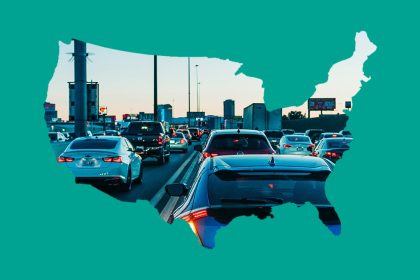Since President Donald Trump took office earlier this year, the regulatory agencies that oversee the U.S. mortgage market have been on the chopping block.
The Trump administration has moved quickly to scale back both the size and the scope of the federal government, including ordering layoffs at the Consumer Financial Protection Bureau (CFPB), the U.S. Department of Housing and Urban Development (HUD) and the Federal Housing Finance Agency (FHFA), which oversees lending giants Fannie Mae and Freddie Mac. But neither Trump nor his officials have been specific about their vision for the agencies — leaving mortgage professionals and borrowers to guess about the future of home lending.
“We have record-high policy uncertainty,” says Chris Flanagan, head of U.S. mortgage and structured finance research at Bank of America.
Supporters of the cuts say that they’ll scale back regulatory overreach in response to the Great Recession of 2007-2009. Critics say Trump threatens to undo needed reforms that protect consumers.
“This is like a bank robber trying to fire the cops and turn off the alarms just before he strolls into the lobby,” Sen. Elizabeth Warren, a Democrat and a key supporter of the CFPB, said in February.
It’s unclear, though, whether a pullback would return the U.S. to the bad old days of the mortgage industry.
“The trick is to find the right balance,” says David Dworkin, president and CEO of the National Housing Conference, a nonprofit advocacy group. “In the Biden administration, the pendulum swung far across the center line. The challenge for this administration is to find that middle ground without creating a free-for-all.”
From little regulation to a lot
Before the Great Recession, the U.S. mortgage market operated with little scrutiny, and in the years leading up to the housing bust, mortgage lending had devolved into cut-throat competition. Many borrowers, wittingly or unwittingly, took on risky loans with low down payments and onerous fees.
When the housing bubble burst in 2007, the mortgage meltdown pulled the global economy into recession. The ensuing foreclosure crisis bogged down the U.S. housing market for years.
In response, President Barack Obama and Congressional Democrats enacted a wave of regulations that outlawed many lending practices which contributed to the crash. Lenders no longer issue the notorious “NINJA” — or “no income, no job or assets” — loans or pay mortgage brokers hefty fees for originating predatory loans.
In general, mortgage professionals say, today’s mortgage market is better for everyone. “I worked in the wild, wild west. I didn’t like that,” says Phil Crescenzo, vice president at Nation One Mortgage.
However, the Trump appointees overseeing housing regulation have suggested that many of these rules overstepped — and they aim to loosen things up.
A standstill at the Consumer Financial Protection Bureau
The CFPB was created in 2010 under the Dodd-Frank Wall Street Reform and Consumer Protection Act. Passed during Obama’s first term, Dodd-Frank aimed to make the U.S. financial system safer for consumers by clamping down on the shady practices by financial companies — subprime mortgage lending, most notably — that led to the global financial crisis. The group’s enforcement actions have resulted in $19.7 billion in consumer relief, according to its website.
But the agency has long been accused of overreach. “The truth is that Democratic heads of the CFPB have put a higher priority on harassing businesses than protecting consumers,” The Wall Street Journal’s editorial board wrote in February.
In February, the Trump administration all but shut down the CFPB. Russell Vought, the agency’s new director, wrote on X that the CFPB had become “woke & weaponized.”
With the CFPB sidelined, mortgage lenders are conducting business as usual, according to Crescenzo. “I don’t think it has an immediate effect,” he says. Lenders might grow more lax, due to a lack of oversight, “but,” he adds, “they’ve been following certain practices for a pretty long period of time.”
And, Crescenzo notes, the Trump administration hasn’t moved to overturn Dodd-Frank and other legislation that curbed the excesses of the pre-crash mortgage market. “Those laws aren’t going away,” he says. “Neither are the good practices.”
Changes at Federal Housing Finance Agency
Trump waited a bit longer to move on the Federal Housing Finance Agency, but in March, the agency’s newly appointed head, William Pulte, removed 14 board members at Fannie Mae and Freddie Mac and named himself chairman of both companies. Dozens of FHFA employees were also placed on indefinite leave.
Fannie Mae and Freddie Mac don’t deal directly with consumers. Instead, they set the qualifying guidelines for conventional loans. It’s up to mortgage lenders to originate loans, which are then packaged as securities and sold to investors. Fannie and Freddie buy about two-thirds of the mortgages issued nationally.
The two companies have been controlled by the federal government since they were bailed out during the financial crisis. Pulte and Treasury Secretary Scott Bessent have said they favor privatizing the mortgage giants, with the caveat that they don’t want to disrupt the mortgage market.
“Any exit from conservatorship must be carefully planned to ensure the safety and soundness of the housing market without upward pressures on mortgage rates,” Pulte said in a February statement to the Senate Banking Committee.
“The challenge is that when you’re operating on the mortgage finance system, it’s like playing the game Operation,” Dworkin says. “You have to be very careful that you stay within the boundaries of sound policy, and avoid unintended consequences, or the buzzer is going to go off.”
New direction at HUD
The U.S. Department of Housing and Urban Development plays a wide-ranging role in the housing market. HUD oversees public housing, and it also operates the Federal Housing Administration, which backs the FHA loans popular with first-time buyers.
Scott Turner, a former NFL player and Texas state lawmaker, was appointed HUD secretary in February. Since then, HUD has developed plans to eliminate about 50 percent of its workforce, including employees in offices focused on disaster recovery and affordable housing.
Turner’s other priorities include exploring opening some federally owned lands for housing development. He has also touted a crackdown on loans to homeowners who aren’t U.S. citizens — but what a slimmed-down FHA means more generally for mortgage lenders and borrowers is still very much a matter of speculation.
FHA loans, for example, are issued not by the federal government but by private lenders following FHA guidelines, so it’s possible that staffing cuts at HUD might not affect borrowers. “It’s too early to tell,” one Beltway lobbyist says. But, the lobbyist notes, when loan officers have questions for FHA employees, getting answers to those questions is now sometimes taking longer than it once did.
Unfortunately, while Turner’s public statements — like those of the other new agency heads — offer some hints about next steps, much remains unclear for agency employees, lenders and the consumers they serve.
Read the full article here





